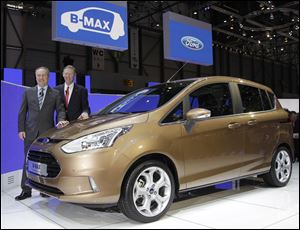
Automakers give small car designs more attitude to win gloomy European buyers, restore profit
3/6/2012
Stephen Odell, left, CEO of Ford Europe, and Alan Mullaly president and CEO of Ford Motor Co., introduce the Ford B-Max during a press preview Tuesday at the 82nd Geneva International Motor Show in Geneva, Switzerland. T
GENEVA — Small cars were looking more sleek and sporty at the Geneva Auto Show on Tuesday as global automakers struggling to make a profit in Europe tried to entice consumers to look past the continent's economic gloom.
Ford premiered the B-Max, a subcompact aimed at families, while Mercedes is looking for younger buyers — read under 50 — for the new A Class. Audi rolled out the third-generation in its A3 series, which 15 years ago was the first compact in the premium market.
Fiat launched its 500L, an elongated version of the tiny 500 city car that is being made in Serbia, and Toyota has put a little snarl on the hybrid version its best-selling Yaris to give it a more aggressive look. Peugeot is setting an automotive standard by making its new 208 smaller than its predecessor.
The launches are a far cry from the days when small cars were spartan money-savers. While remaining easy on fuel consumption and light on emissions, these models are tooled with the latest safety features and touches of luxury to spruce up the compact and subcompact segments that comprise some 80 percent of the European market.
"Remember when smaller cars used to be cheap and cheerful? Now the consumers want the finest quality, the finest fuel efficiency, safety and design," said Ford CEO Alan Mulally.
The problem for European mass market automakers is that consumer demand has shriveled under the pressure of the sovereign debt crisis: this year sales are expected shrink nearly 5 percent to 12.9 million units, according to the Center for Automotive Research.
The onset of the financial crisis in 2008 brought cash-for-clunker incentives that allowed drivers to get a bonus to buy a new car if they junked an old one. The incentives propped up the industry and delayed the inevitable reckoning with the fact that Europe has too many idle factories — something most European auto executives say shouldn't be repeated.
"I don't want incentives or financial assistance," said Fiat and Chrysler CEO Sergio Marchionne told reporters. "Fiat is financially solid and opposes any intervention to prop up the market."
Fiat is among a long list of European automakers that is losing money in Europe that includes Peugeot-Citroen PSA, General Motors' Adam Opel, and Renault. Fiat is aiming to build cars in Italy for export to the United States, where it has a 58.8 percent share in Chrysler through a nearly three-year-old alliance.
But it first needs to streamline its Italian factories, which are operating at just 60 percent capacity, according to figures from IHS automotive.
Idle production lines cut profits, and European automakers frequently have faced national resistance to any moves to close factories in response.
Stephen Odell, CEO of Ford of Europe, said European policymakers should stop getting in the way of plant closures as the industry seeks to balance supply with shrinking demand. Ford plants are running above 90 percent, thanks to closures in 2008 and 2009.
"I believe policymakers can stop making statements that they understand capacity should be taken out — but not in my country," Odell said.
A fresh alliance inked last week between General Motors Peugeot is a sign that the industry is looking at ways to cut costs.
GM will take a 7 percent stake in Peugeot, Europe's No. 2 automaker, in a deal that foresees a common platform by 2016 and synergies in the purchase of parts. The carmakers say it will save them $2 billion a year within five years, split roughly equally.
So far, the automakers have not discussed the possibility of job cuts and factory closures — moves expected by analysts.
The head of General Motors Europe, Karl-Friedrich Stracke, on Tuesday tried to dampen fears of mass job cuts in Europe, but didn't rule them out.
"We need a sustainable setup. No company can keep making a loss," Stracke said.
Meanwhile, Japanese car maker Nissan, which is in an alliance with French automaker Renault, announced it is investing 125 million pounds ($198 million) to build the new Invitation compact car at its British factory — a rare expansion of auto production in western Europe. Nissan said the Invitation will compete with Ford's Fiesta and Volkswagen's Polo models, and debut next year.